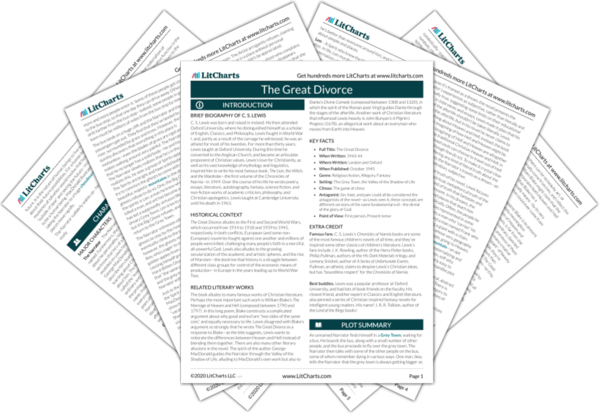Dreams, Fantasy, and Education
The unnamed Narrator of The Great Divorce has a long, vivid dream, during which he witnesses surreal scenes from the afterlife and learns valuable lessons about Christianity, morality, and love. The fact that the novel is structured as a dream suggests two important, closely related questions: first, what are the strengths and weaknesses of dreams and fantasy as Christian teaching tools; second, to what extent can Christianity be taught at all?
Because it’s framed as…
read analysis of Dreams, Fantasy, and EducationHeaven, Hell, and the “Great Divorce”
C. S. Lewis intended The Great Divorce in part to be a rebuttal to a famous poem by the English author William Blake: The Marriage of Heaven and Hell. Essentially, Blake used his poem to argue that Hell gets a “bad rap.” While Christian theology claims that Hell is wicked, and should be avoided at all costs, Blake proposed that Hell—and evil in general—was a vital component of creativity, enlightenment, and happiness. In all…
read analysis of Heaven, Hell, and the “Great Divorce”Christianity and Common Sense
In The Great Divorce, C. S. Lewis uses fiction and fantasy to make a strong argument for the truth and value of Christianity. Surprisingly, though, the novel never offers a specific definition of Christianity; indeed, it would seem that the only two beliefs that a Christian must have are a belief in the existence of God and a belief in the divinity of Jesus Christ. Using this simple, straightforward definition of Christianity, the novel…
read analysis of Christianity and Common Sense
Free Will and Salvation
At the heart of The Great Divorce (and Christianity) is the concept of free will. The early Christian thinker Saint Augustine proposed a useful way of understanding free will: if a human being acts a certain way, and, under identical circumstances, could have acted differently, then that human has exercised their free will. Lewis never explicitly defines free will in his book, perhaps assuming that his readers already understand what it is. Nevertheless, The Great…
read analysis of Free Will and SalvationLove, Sacrifice, and Sin
According to the novel, the only way for a human being’s soul to be accepted into Heaven is for the human to love God above all other things. But why, then, must humans love God in order to be saved—and why is it often so difficult to love God?
The Great Divorce, following Christian theology, posits that true morality is only possible if it comes from God. While Lewis never explicitly states why it’s…
read analysis of Love, Sacrifice, and Sin











